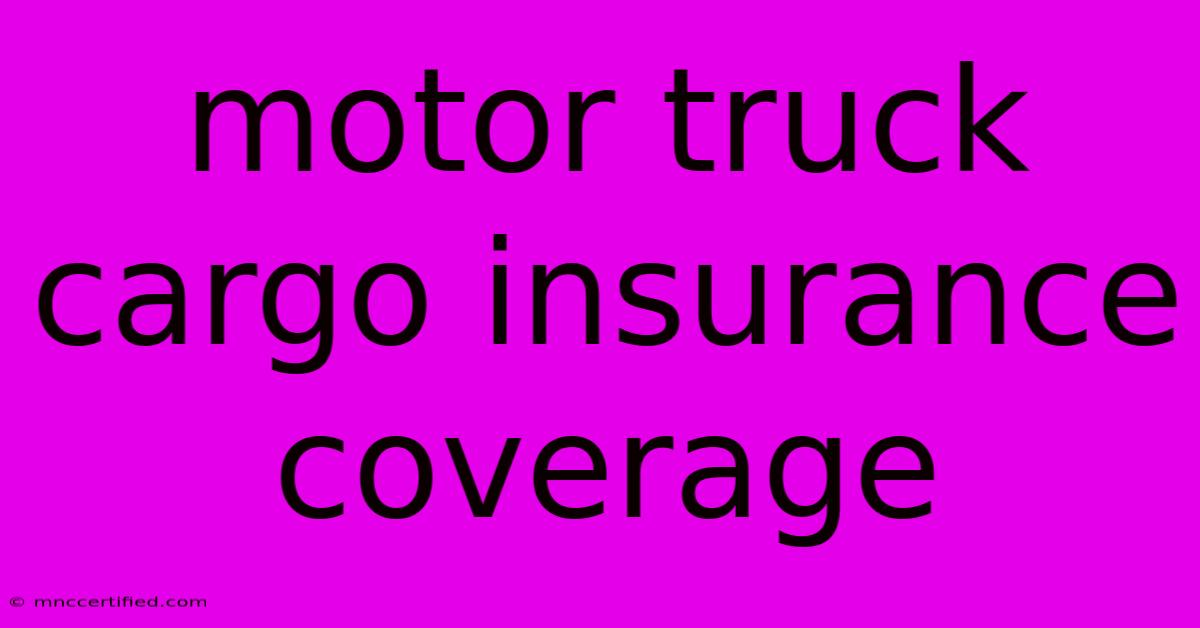Motor Truck Cargo Insurance Coverage

Table of Contents
Motor Truck Cargo Insurance Coverage: Protecting Your Valuables on the Road
Motor truck cargo insurance is essential for businesses that transport goods, providing financial protection against losses due to various perils during transit. Whether you own a fleet of trucks or operate a single vehicle, understanding the ins and outs of this insurance is crucial. This article delves into the key aspects of motor truck cargo insurance coverage, helping you make informed decisions for your business.
What is Motor Truck Cargo Insurance?
Motor truck cargo insurance is a specialized type of coverage designed to protect the goods you are transporting in your truck. It provides financial compensation for losses that occur due to events like:
- Accidents: Collisions, rollovers, and other accidents can damage or destroy the cargo.
- Theft: Thefts of entire loads or individual items are a common concern.
- Natural Disasters: Floods, earthquakes, and other natural disasters can significantly impact cargo safety.
- Fire: Fires can cause extensive damage to both the truck and the cargo.
- Vandalism: Deliberate damage to the cargo can lead to significant financial losses.
Types of Motor Truck Cargo Insurance Coverage
There are several types of motor truck cargo insurance coverage available, each with its own specific benefits:
1. All-Risk Coverage: This comprehensive option provides coverage for all perils, except those specifically excluded in the policy. It offers the most comprehensive protection, but it also tends to be more expensive.
2. Named Peril Coverage: This type of coverage only protects against specific perils listed in the policy. It is less expensive than all-risk coverage but provides less comprehensive protection.
3. Blanket Coverage: This option provides coverage for all goods transported by your business, regardless of the individual shipment value. It is ideal for businesses that frequently transport goods with varying values.
4. Specific Coverage: This type of coverage is tailored to individual shipments, providing protection for specific goods with a defined value. It is suitable for businesses transporting high-value items or goods with specific requirements.
Choosing the Right Motor Truck Cargo Insurance Coverage
The best type of motor truck cargo insurance coverage for your business depends on several factors:
- The value of your cargo: If you transport high-value goods, all-risk coverage may be the best option.
- The frequency and type of your shipments: Blanket coverage can be efficient for frequent shipments, while specific coverage might be better for occasional or high-value shipments.
- Your budget: Consider the cost of each coverage option and choose the one that offers the best balance between cost and protection.
- Your risk tolerance: Evaluate your risk appetite and choose coverage that aligns with your comfort level.
Factors Affecting Motor Truck Cargo Insurance Premiums
Several factors influence the cost of your motor truck cargo insurance premiums:
- Value of the cargo: Higher value cargo generally attracts higher premiums.
- Type of coverage: All-risk coverage typically costs more than named peril coverage.
- The frequency and distance of your shipments: Frequent long-distance shipments can increase premiums.
- Your safety record: A good driving record and a safe operating environment can lower your premiums.
- Security measures: Implementing strong security measures, like GPS tracking and cargo theft prevention systems, can help reduce premiums.
Essential Considerations for Motor Truck Cargo Insurance
When purchasing motor truck cargo insurance, consider these essential aspects:
- Policy Limits: Ensure the policy limit covers the full value of your cargo.
- Deductible: Choose a deductible you can afford in case of a claim.
- Exclusions: Understand the perils excluded from coverage and consider any additional options.
- Claims Process: Learn about the claims process and ensure it is efficient and straightforward.
- Endorsements: Explore additional endorsements that might enhance your coverage, such as coverage for delays, spoilage, or contamination.
Off-Page SEO Strategies:
- Link Building: Reach out to other industry blogs and websites relevant to trucking and logistics to build quality backlinks to your article.
- Social Media Promotion: Share your article on platforms like LinkedIn, Twitter, and Facebook, using relevant hashtags.
- Community Engagement: Participate in industry forums and online communities related to trucking and cargo insurance, sharing insights and answering questions.
By understanding the intricacies of motor truck cargo insurance coverage, you can make informed decisions to protect your valuable cargo and mitigate risks. With the right insurance plan in place, you can confidently navigate the complexities of transporting goods and ensure the financial well-being of your business.

Thank you for visiting our website wich cover about Motor Truck Cargo Insurance Coverage. We hope the information provided has been useful to you. Feel free to contact us if you have any questions or need further assistance. See you next time and dont miss to bookmark.
Featured Posts
-
Ind Vs Sa 2nd T20 I Stubbs Leads Sa Win
Nov 11, 2024
-
The Edmund Fitzgerald A Ship Lost At Sea
Nov 11, 2024
-
Title Insurance Standard Vs Enhanced
Nov 11, 2024
-
Chelsea Cruises Past Liverpool In Wsl Win
Nov 11, 2024
-
10 000 Surety Bond Washington State
Nov 11, 2024